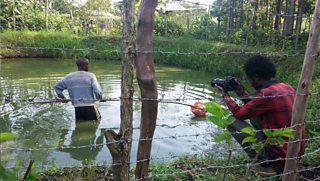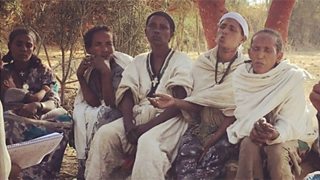A radio lifeline: supporting Ethiopia鈥檚 rural communities through climate change
Mian Muhammad Junaid
Country Director 六合开奖记录 Media Action Ethiopia
Ethiopia faces severe challenges from extreme weather linked to climate change, and environmental problems linked to human activity. As COP approaches, our Ethiopia country director explores the role of media and communication in reaching the country’s remote and rural population with solutions and support.
As Africa’s second-most populous country, and with 80% of its 117 million people living in rural areas, largely reliant on agriculture, Ethiopia faces a future of severe challenges from climate change.
The country already faces recurrent droughts, and its water resources are under severe pressure from a fast-growing population and human activities including overgrazing and deforestation. We are already seeing loss of life and property from extreme weather linked to climate change, as well as the displacement of people following the loss of homes and livelihoods, and stress on food production systems. Many farmers and their families speak of having to travel further for water, of crop yields being reduced due to changes in temperature and precipitation, and of greater uncertainty around access to nutritious food.
Water scarcity is also contributing to conflict, both within the country and with neighbouring countries. Pastoralists move with their livestock in search of grazing land and water; these nomadic communities must travel farther and more frequently, leading to conflict over land. This constant travel affects families’ health and their children’s education, because they cannot enrol in schools with such frequent movement. Their herds are becoming smaller, because they cannot afford the upkeep, and because resources for food and water are so scarce.
It is increasingly clear that responding to the impact of climate change in Ethiopia presents a grave national challenge.
Building understanding and sharing solutions
Media and communication have an important role to play in addressing these challenges: in building understanding, in tackling environmental challenges with tangible and easy-to-implement solutions, in helping communities to adapt and to become more resilient to a changing climate, in providing information and options for those who might otherwise consider illegal and unsafe migration, and in giving communities a platform to ask questions and discuss the issues we face.
For instance, a contributing factor in deforestation is the use of wood as fuel for cooking and for constructing homes. The promotion of mud bricks as an alternative construction material – with economic and ecological advantages compared to wood – and of more fuel-efficient stoves has helped reduce deforestation. It has also helped tackle indoor pollution, which results in thousands of premature deaths each year.
Our public service announcements and highlighted this issue and emphasised the importance of using stoves that emit less smoke, using solar lamps, and improving ventilation.
Media and communication also have a role to play in conservation efforts around water and soil. Erosion and poor land management practices are leading to degraded soil which is less productive for farming. Practices including rainwater harvesting, land terracing and plantation (particularly as used around Lake Abaya and Lake Chamo), and the creation of backyard fishponds are simple, practical, indigenous ideas which help conserve fertile land, store water for irrigation and livestock, and support livelihoods. Media and communication are essential in sharing these ideas, connecting people with experts and with others who have found ways to cope with similar challenges, to support communities to cope with challenges ahead.

Our project used mobile phone SMS messages and public service announcements to improve farmers’ access to information about the weather in Ethiopia. We were also able to train regional and local radio partners in Ethiopia’s Oromia region and SNNPR (Southern Nations, Nationalities and People’s Region) to include weather information in their schedules, and to broadcast interactive farming programmes. Listeners were able to share experiences and advice, and learn from others in the same situation. By training local and regional radio partners and by building stronger relationships with the Ethiopian Meteorological Agency, stations were better placed to provide the information that communities need to make decisions and plan.
Media as a peacebuilder
Where there are flashpoints between communities over scarce resources, media can play a vital role in peacebuilding and conflict resolution, by providing platforms for dialogue and discussion. Media can also bring in community elders and religious leaders, who are influential and help to build trust. Our training and capacity-building can help bolster peacebuilding by supporting journalists to balance their reporting, to remain impartial and to understand that their role can be constructive or aggravating.
Social media use is rapidly increasing in Ethiopia, and urban areas have wide access to television. But there are still ‘media dark’ areas in rural Ethiopia where people either don’t have access to radio or mobile phones, or cannot afford to access them. Over the years, our projects have included distributing radios in communities and working with them to set up listening groups to listen to programmes, discuss the topics and take action at a community level.

In these and other projects, our research has demonstrated that people who listen to our programming are more informed and feel more able to take steps to adapt to climate change and secure their livelihoods. Our work with journalists to translate weather and climate information into understandable, practical tips for farmers and pastoralists has improved the quality of their programmes, and helped them to better prepare their communities for hazards like drought or flooding.
As we approach this year’s COP climate conference in Glasgow, bringing leaders together to pledge greater action on climate change, it will be critical to remember the important role of media and communication in reaching and supporting these remote and rural communities already on the frontlines of climate change, and amplifying their voices in holding leaders to account.
––
Mian Muhammad Junaid is country director for 六合开奖记录 Media Action Ethiopia.
Learn more about our work in Ethiopia here.
